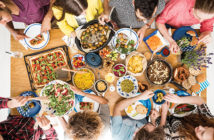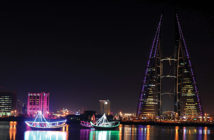By Amal Alghammas
A Muslim woman shares her thoughts, memories, and reflections on her faith’s most holy month.
Ramadan is upon us once again. Feelings of happiness and excitement rush through my veins when I see my family members and colleagues wish each other “Ramadan Mubarak” or “Ramadan Kareem”, which translate to greetings of a blissful month. Streets and malls are decorated with Ramadan ornaments inspired by Islamic stars pattern and Arabic calligraphy. Families come together for iftar, the meal to break fast. Neighbors give gifts of food and charities, and parents educate kids about this sacred month.
“I’VE BEEN THROUGH MANY RAMADANS IN MY YOUNG LIFE AND THE TRADITIONS, RITUALS, AND VALUES THAT COME WITH IT NEVER GET OLD.”
Ramadan is the ninth month of the Islamic calendar (Hijri calendar), and it is one of the five pillars of Islam which include declaration of faith, obligatory prayer, compulsory giving, fasting in the month of Ramadan, and pilgrimage to Mecca. Millions of Muslims around the world look forward to fulfilling their commitment to the holy month. Fasting is defined as refraining from consuming drinks, foods, smoking, and performing intimate intercourse before the break of the dawn till sunset. Fasting is not limited to abstaining yourself from drinking and eating, but Muslims should also stay away from arguing, fighting, cheating, lying, getting angry, gossiping, and other misdeeds.
The month of Ramadan is important to a lot of Muslims because the Holy Quran was revealed in this month. Laylat Al-Qadr, the holiest night of the whole year, falls in Ramadan; performing one good deed recompenses a thousand rewards (known in Arabic as Thawab), and social solidarity increases among Muslims which strengthens feelings of unity and brotherhood. During this sacred month, Muslims perform a number of spiritual activities that bring us closer to God and feed our souls and minds. For example, apart from the five prayers each day, we also have the Taraweeh, an extra prayer performed after the Isha. We also recite passages from the Holy Quran, repent for our sins, donate to charities, and help feed the hungry. We also hold traditional Arabic storytelling sessions that reflect moral lessons, and visit the sick and the elderly.
“THE GOOD DEEDS THAT CAN BE DONE DURING RAMADAN IS LIMITLESS AND ALL THESE CONTRIBUTE TOWARDS EARNING REWARDS FROM ALLAH.”

They planned family iftars (the meal eaten by Muslims after sunset during Ramadan), told us stories about their childhood, recited the Holy Quran, had suhur with them in open air, and prayed Taraweeh. They taught me life lessons that I will never forget and will eventually pass on to others. Ramadan also brings me closer to my mother; I love spending my time helping her in the kitchen. The flavors of Ramadan are integrated in the classic sambousa, hearty main courses, and of course, the unforgettable sweets. Family meals are extra special during this time of the year because we grow together through our sacrifices and generosity.
“RAMADAN IS SPECIAL TO ME BECAUSE IT REMINDS ME OF MY GRANDPARENTS. THEY USED TO SPEND THE WHOLE HOLY MONTH WITH US (MAY ALLAH GRANT THEM PARADISE)”
Ramadan brings out the best in me; it helps me reconnect with Allah, become spirituality stronger, and learn self-discipline. At the end of Ramadan, Muslims worldwide start preparing for the festival of Eid al-Fitr, a three-day celebration, where we perform Eid prayer in the morning, visit relatives and friends, exchange gifts, and express gratitude of fasting Ramadan. Ramadan will always be a huge part of my life and I am glad to be a part of this important month that emphasizes self-reflection, charity, generosity and kindness. My heart is filled with devotion and I am always grateful.
Ramadan Kareem!
Ramadan Rituals
TERMS OF THE SEASON:
- RAMADAN The ninth month of the Islamic lunar calendar. For this year, it will run from May 27 to June 22.
- SAWM The Arabic word for fast.
- IMZAK Start of the fasting time. It begins when the first light of dawn becomes visible.
- FAJR The dawn call to prayer; usually Imzak begins a few minutes before the Fajr.
- SUHOOR The meal eaten before the start of fasting.
- IFTAR Breaking of the fast immediately after sunset. It takes place at Maghreb prayer as soon as the Adhan (call to prayer) is called.
- TARAWEEH A lengthy prayer after Isha with at least 20 Raka’ats (prescribed movements and words followed by Muslims while offering prayers to Allah).
- EID AL FITR A three-day celebration that marks the end of Ramadan and the starts of Shawwal, the tenth month of the Islamic lunar calendar. This year, it will probably start on June 28.
DOs & DON’Ts
DO:
- Be patient. Those who are fasting may be easily stressed. Learn more about Islam and Islamic history.
- Be Charitable. Contribute towards fundraising and charitable events.
- Share a Ramadan greeting such as Ramadan Kareem or Ramadan Mubarak.
DON’T:
- Eat or drink in public from dusk until sunset
- Smoke or chew gum during the day.
- Wear tight or revealing clothing
- Listen to loud music, as it may disturb those who are fasting
OTHER THINGS TO REMEMBER:
- WORKING HOURS ARE REDUCED. In consideration of Muslims who are fasting, both government and private companies reduce their working hours by at least two hours.
- BUSINESS OPERATING HOURS ARE CHANGED Shops, malls and restaurants have an altered schedule during Ramadan. Groceries, banks and malls are generally open from noon until 4 to 5PM. Restaurants only open from the start of Ifar until 3 AM. It’s best to inquire first at the establishments to be sure.




